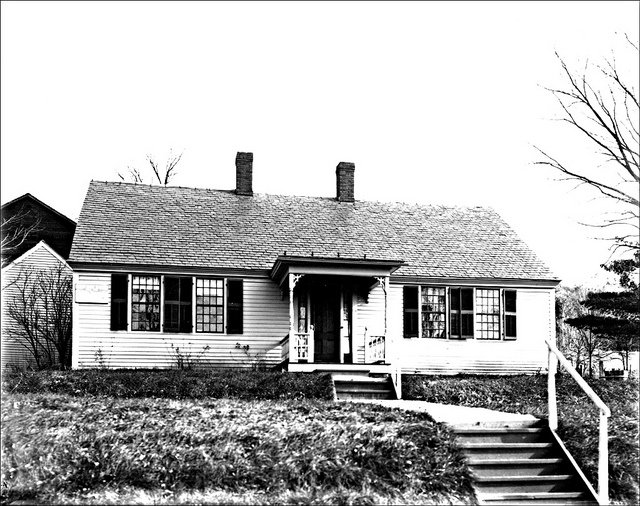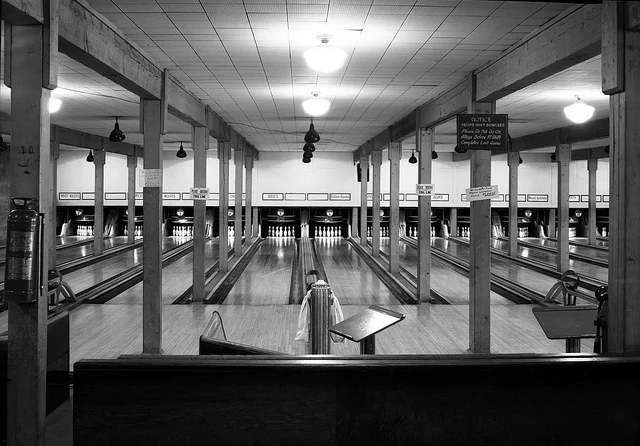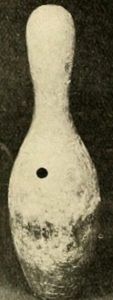 While sitting with Lena at their kitchen table the Sunday before, Carl Mobley had experienced the annual burst of optimism that marked the beginning of bowling season. But not now. With the Thursday Night Classic Bowling League only days away, he’d found out somebody was after his job as League Secretary. The very thought of it transformed his face into a billboard of betrayal, hurt, and worry. Carl couldn’t understand why anyone would want to take this from him–and he didn’t know what to do about it.
While sitting with Lena at their kitchen table the Sunday before, Carl Mobley had experienced the annual burst of optimism that marked the beginning of bowling season. But not now. With the Thursday Night Classic Bowling League only days away, he’d found out somebody was after his job as League Secretary. The very thought of it transformed his face into a billboard of betrayal, hurt, and worry. Carl couldn’t understand why anyone would want to take this from him–and he didn’t know what to do about it.
At fifty-two he was a worn-down, vague looking man with remnants of hair that he persisted in combing over, and eyes narrowed in a perpetual squint. With only one hundred fifty pounds on a five ten frame, his wife called him “sickly” and sometimes, “Ichabod”.
Every September when bowling season came around, Carl perked up–his soft blue eyes brightened, his shoulders went back, and his pace quickened. “You know how I feel, Lena?” he’d said on Sunday, his last good day. “I feel like a kid going back to school. Kinda eager but a little nervous, too.”
She shrugged, poured some coffee from her cup into the saucer and blew on it. Then holding it with two chubby hands, she drank from the saucer. Carl tried, unsuccessfully, not to stare at the black hair sprouting from her knuckles.
“Coffee’s too damn hot,” she complained.
“I was just remarking on how the season’s getting ready to start up.”
Lena made a sour face. She always looked as if she had just lifted the lid on a garbage can. “No big deal to me.”
“It’s a big deal to me,” Carl whispered, not wanting to provoke her. Weekends were long enough.
He thought of the upcoming season. Once the first games had been rolled he would enter into the weekly Tuesday evening ritual that had not varied in ten years. After supper, he’d unfold a rickety Samsonite card table and set it up in the small living room. Then he’d drag in a wooden chair from the kitchen, put on an old-fashioned green eye shade, and call out to Lena.
“Anybody phones, tell them I’ll get back. I’m doing the averages.”
“It’s not brain surgery!” she’d scoff, just loud enough for him to hear.
Carl would lay out the rectangular forms and update the weekly averages for each bowler and for each team, figuring the numbers on a scratch pad with a pencil before entering the results on the league register in ink. He would deliver the results on Thursdays, positioning himself near the bulletin board where he’d post the tallies. Then he’d watch and listen as his fellow sportsmen gathered in twos and threes in front of the roster, ribbing each other.
“Look at these numbers. You guys haven’t got a chance,” Phil Copley, sponsor of the Copley’s Phillips 66 team, would say regardless.
And Charlie McGuire, captain of the Ace Pump and Well squad, would answer back. “Your problem is you drink too many of those brewskis.”
“Yeah? Your problem is you boys don’t drink enough of ‘em.”
And so it went, with Carl standing by, flushed with belonging.
The only part of the job that made him uncomfortable was when he had to extract league dues from the slow payers. It was necessary though. The manager of the alley and the pin boys had to be paid. “Pete, I hate to ask, but…”
“Is next week okay? I’m a little short right now.”
Carl would fidget and look at the floor. “Sure. Next week.”
The bowlers could hardly remember when the League Secretary–actually, the position was that of Secretary-Treasurer–was anyone other than Carl. He did a good job that no one else wanted. The previous year at the league’s fall meeting, Dick Morton, a 185 average bowler for Pinkerton’s Body Shop, stood up. “In nominating Carl, I just want to say, without him as our secretary, we just wouldn’t have a league.”
Carl’s face had burned with pride.
If only it had been the same at the office. For nearly thirty years he had worked in the local telephone company’s billing department, putting down deeper roots than the potted India rubber plant that shared his corner. He’d lost track of all the promotions that had bypassed him. Most hurtful was when he’d been jumped by Jack Spruance for supervisor. Spruance was ten years his junior.
“I shouldn’t be surprised, the way he’s always glad-handing the big shots,” Carl had observed to Lena. “Drinking with them at the company Christmas party. Spreading his charm like fertilizer.”
“He took classes at the College.”
“Used to be high school was enough. I’ve worked hard. It’s not fair. It’s just not fair.”
Not much was. A year out of school he’d showed up for a baseball tryout with a double-A team down at the state capital. He had a good chance. But his arm went out with the first pitch. And that was that.
His love life was the same story. All these years later and he still pined for Mary Tracy, his first–and only–true girlfriend. He’d taken her to movies and roller skating and twice to the amusement park at Beam Lake. He guessed he hadn’t been exciting enough for her. She had dropped him and run off with a boy who later joined the Army and got himself killed in Korea. Someone told Carl she had remarried and was living out west.
Then came Lena. Carl had already passed forty when she started dropping notes and baked goods off at his desk on the way to her own. It all just sort of happened. He hadn’t realized that anything could be worse than unrelieved loneliness. But his wife was. She brought to the marriage two Siamese cats and an aptitude for criticism. Little else. It wasn’t long before she slept in the bedroom and he installed a mattress for himself in the basement.
On Sunday, between coffee slurps she’d said, “You’re never going to get anywhere spending all that time in a smoky bowling alley. It’s not healthy. You need fresh air. Part of your problem is you’re so weak looking, Carl.”
Why didn’t she quit harping on his lack of success? Carl wanted to get ahead. He just always seemed to get outmaneuvered.
“Thing about bowling, Lena, is it’s different. It’s fair. Only thing that counts is knocking down those pins,” he said.
She raised a heavy, unimpressed brow.
If words came easier he would explain what else he liked about bowling–the heft of the ball, the sensation as it glided from his hand down the lane, the polished wood, the clattering crash of the pins. He liked the shirts with their stitched lettering. But most of all, he liked the banter and camaraderie otherwise absent from his life. For a season full of Thursday nights he counted for something. He could not describe the joy when a teammate patted him on the back after he rolled a strike. “Way to go, Carl.” Best of all, carrying the title of League Secretary.
“It’s something I like, that’s all.”
He’d bowled a consistent 175 for years. He’d started right out of high school as a backup with the All Star Roofing Company Stars. After the Stars, Carl bowled for the Kelsey’s Meat Market Vagabonds and then Twin Valleys Lumber. For nearly a decade, he’d been bowling for Lucky’s Bar and Grill.
He considered joining Lucky’s team one of the best things that ever happened to him. His average had gone up by five pins and soon after he’d been named League Secretary. Willard Cartwright, the previous secretary, had succumbed to a heart attack half way through the 1952-53 season. Keeled over and died right on Lane 6.
Since he worked in the billing department, his fellow bowlers calculated Carl must be good with numbers. Right away he put up his card table and set about updating the records. He signed the weekly averages sheet at the bottom with a flourish. People commended him for doing a good job. He heard several times that, “Willard Cartwright bollixed things up more than once. Took forever to straighten them out.”
When Carl got the job, he went right down to Hanson’s Stationary and bought a book of printed receipts, ordered a half dozen trophy catalogs, and visited a local seamstress to see if she would give him a special deal on lettering shirts. (She wouldn’t.) He even had some business cards made up:
Carl Mobley – Secretary-Treasurer, Thursday Night Classic League, Twin Valleys Lanes, Telephone: Valley 841R.
“If you’re going to do something, you have to do it right,” he told Lena.
He gave a card to the seamstress and another to the proprietor of the Twin Valleys Lanes. He couldn’t think of anyone else to give any to, so except for three he always carried in his billfold just in case, the rest went into a kitchen drawer. Sometimes, though, he’d take one out for a quick look.
But now everything had gone haywire.
He’d stopped at the bowling alley after work on Monday to see how the summer renovation of the lockers had turned out. It concerned him when he discovered the work wasn’t finished. Carl went into the bar to look for Jack Talley, who managed the bowling alley and doubled as daytime bartender. Talley was on the phone and signaled for him to wait in a booth. The aroma of hot dogs bubbling and steaming behind the bar masked–but not quite–the smell of stale beer and the remnant odor of disinfectant that floated out of the restrooms. The place was dark at that time of day.
Sitting there in the booth studying generations of carved initials and words that roughened the tabletop, Carl recognized the voices of Dick Morton and Jack Larsen in a booth behind him. He swallowed hard when he heard his own name.
Morton said, “I didn’t know so many people wanted him out. I always figured Carl does as good as anybody.”
Larsen cleared his throat. “Times change.”
It was like listening to a death sentence read out before his execution. When they were boys, Morton had once thrown a stone that struck Carl in the forehead. Knocked him down. He’d just done it again. Carl slipped out, hurried home, downed a double Alka-Seltzer, and slumped into his Naugahyde recliner. His chest felt hollow. His mind skittered. He stared at his Hush Puppies. Only a rumor, he told himself. That’s all. Yet his eyes moistened and he had trouble swallowing.
Just a couple hours later the president gave him a call.
“Carl, I was kind of wondering if maybe you weren’t getting a little tired of all the league work you do for us.”
“No. I don’t mind. I’m used to it. Easy as can be.”
“Well, some of the guys were talking about how maybe you were considering stepping down.”
“I don’t know why. I never said that.”
“I’ve had half a dozen calls or more. Word’s around you want to quit.”
“I never…”
“Well, Carl. I have to tell you straight out, you’re probably going to have some competition in the election. Tom Richardson’s kinda interested in taking a turn. Why don’t you think on it a while?”
Tom Richardson. Nice-looking young fellow. Sold water softeners. Fine bowler. He had always been friendly. Maybe he needed the fifty dollar a year salary? When Carl collected dues Tom sometimes asked him to wait, saying things were tight.
Later, Carl tried to talk with Lena about what was happening. “I could care less what you do but it seems to me you ought to show some gumption, for once. Fight for it.”
Carl’s hands got wet. What if the candidates had to get up at the League meeting and say something? He’d tried the Toastmasters once. His fellow Toastmasters had tittered as he struggled through five minutes on “A History of Twin Valleys – the Early Years.” He never went back.
“Seems to me like you better get your ducks in a row,” Lena snapped. “Call all your little friends.”
Carl thought he got along with most of the bowlers, but he didn’t know to which of them he
should turn to for support. Maybe Dick Morton. He had sounded sympathetic in the bar. Carl’s resolution faltered twice before he actually dialed.
“Dick, I’m calling about the…I hear some people want to get me out as secretary. I wondered…”
He wished he had put the receiver down a third time.
“It’s true. There’s some who want Tom Richardson to step in. I guess he’s been talking it up with quite a few of the guys.”
Images of Spruance hobnobbing with the phone company execs flitted through Carl’s mind. Tom Richardson must be pulling the same kind of dirty tricks.
“But why?”
“Hell, Carl. Regular election? You’d knock his socks off.”
“I don’t understand. What kind of election would it be?” Carl sat stiffly on the edge of his chair, leaning over the phone.
“It’s kind of complicated. I don’t want you to think I believe a word of it.”
“Believe a word of what?”
“Well, there’s a rumor going around–just a rumor mind you–that before Cartwright died, he told… well, he told somebody there was $350 in the League treasury. I don’t know how to put it to you, Carl. There’s some say that money never got properly accounted for.”
“It was ten years ago and I found every penny! We only had $14.00. Who’d say a thing like that?”
“Beats me. Everybody’s heard it, though. For what it’s worth, Carl–I don’t think anybody who knows you buys it for a minute.”
“What should I do?”
“I think things are kind of clouded up. I’ve got a feeling they’re going to pick Tom at the meeting. I expect you can avoid some trouble for yourself if you just sort of step aside. Call Charlie Fellows; tell him you haven’t been feeling too good. Tell him you don’t want the job anymore.”
“But, I feel fine. After all these years…” Carl bit his lip. “Won’t my friends…”
“Rumor’s like an infection. Spreads here, then there. I’m sorry, Carl.”
“But, Dick, couldn’t you talk to some of them?”
“I think you’ve done a great job. I’d like to nominate you again. Really would. Don’t think I can, though. Sorry.”
Stunned, Carl lingered by the phone. Then he did like Dick suggested and called the league president back.
“I understand,” Charlie said. “Tom’ll need to pick up the notebooks and rosters. I know it’s late but can he come by tonight? No time like the present! Start of the season, you know.”
Carl didn’t answer. His face sagged as he put down the phone.
Lena was watching from the doorway. “You’re hopeless, Carl. Hopeless! I’m going to sleep.”
He soon heard her snoring in the bedroom–his bedroom. For a long time he sat in the dim light–two burnt out bulbs in the three-way–studying the rose-patterned wallpaper Lena had installed in the living room. He hated it. He fondly recalled the old paper, with its green English countryside and men in red coats riding to hounds, repeated over and over. He thought of Jack Spruance. How could he sit at his desk even one more day with Spruance lording it over him?
And then his mind skipped over to Tom Richardson spreading lies.
A crooked grin worked its way across Carl’s face. He got out of his chair and marched into the kitchen. He opened the cupboard where he filed the records for the Thursday Night Classic League in black binders. He filled his arms and walked out the door straight to the rusting barrel that served as a backyard incinerator. He dumped his load into the barrel and went back for more. Soon a crackling fire sent the averages–team by team, bowler by bowler–wafting into the night sky.
Carl made one more trip to the kitchen. He’d forgotten the business cards. He pitched them into the fire and withdrew the three from his billfold, flipping those into the flames, too. He pretended he was burning the secret code before the enemy arrived.
Then he went back inside, climbed up on a side chair and took down a 12 gauge double barrel shotgun from the closet shelf where it had long laid undisturbed. He felt around for the box of shells. Listening to Lena’s snores he sat in the recliner and loaded the weapon. He shook his head and shut off the lamp. A shotgun was easy to use. Just point and pull the trigger. You could use it on yourself too, although the mechanics were more complicated.
The breeze rattled the leaves on the old oak in the front yard and from time to time pulses of soft orange heat lightning filtered through the screen. He’d been sitting for twenty minutes when someone rapped softly on the door.
“Carl, you there? It’s Tom Richardson. ”
“Door’s open. Come on in.”
Share this post with your friends.




2 thoughts on “Keeping Score by Lawrence Farrar”